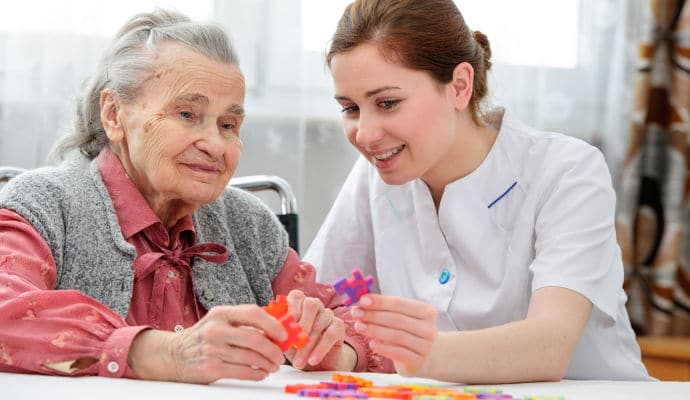Enhancing Convenience and Safety Through Alzheimers Care Charlotte Solutions
Enhancing Convenience and Safety Through Alzheimers Care Charlotte Solutions
Blog Article
Developing a Safe and Encouraging Setting for Alzheimer's Treatment
The production of a safe and helpful atmosphere for people with Alzheimer's is critical in improving their top quality of life. This entails not only physical adaptations within the home, such as minimizing risks and including acquainted components, yet likewise the implementation of structured routines and meaningful activities that satisfy their cognitive needs. In addition, understanding the psychological and emotional measurements of treatment can considerably affect their complacency and connection. Checking out these complex approaches can reveal vital understandings into effective caregiving techniques that may transform the everyday experiences of both caretakers and clients.
Understanding Alzheimer's Requirements
Regularly, individuals with Alzheimer's illness show a variety of demands that call for customized approaches to care. As the problem proceeds, cognitive decline shows up in different ways, affecting memory, reasoning, and also the capacity to execute daily tasks. Caretakers have to recognize these evolving demands to provide appropriate assistance and ensure a better of life for those impacted.
One crucial element of understanding Alzheimer's needs is acknowledging the importance of routine and familiarity. Individuals often discover comfort in well established patterns, which can decrease stress and anxiety and confusion. Caregivers must make every effort to create structured day-to-day timetables that include significant activities lined up with the individual's capabilities and rate of interests.
In addition, efficient interaction is vital. Individuals with Alzheimer's might have a hard time to share themselves or comprehend intricate language. Caretakers ought to utilize easy, clear language, usage non-verbal cues, and method energetic listening to cultivate understanding and link.
Caregivers must urge engagement in community tasks or family gatherings, promoting a feeling of belonging and objective. Understanding these varied requirements is vital for creating an encouraging treatment atmosphere.
Designing a Safe Home
Producing a safe home for people with Alzheimer's disease is important to decreasing threats and advertising self-reliance. The style of the home need to focus on safety and security while enabling for individual comfort. Remove possible threats such as loose rugs, sharp items, and mess, which can lead to falls or crashes. Ensure that paths are well-lit and clear, as correct lighting lowers disorientation and enhances flexibility.
Incorporating flexible features is likewise critical. Mount grab bars in restrooms and near stairways, and take into consideration using non-slip floor coverings in damp areas. Additionally, making use of different colors for wall surfaces and floors can assist in identifying areas, helping to reduce complication.
Familiarity is important for people with Alzheimer's. Personalizing the environment with familiar things and photos can reinforce a sense of belonging and security - Alzheimers Care Charlotte. It is additionally useful to have actually a marked area for daily tasks, such as reading or crafting, which can offer framework to their day
Finally, executing a safe and secure outdoor space enables secure expedition while getting in touch with nature. By attentively designing the home setting, caregivers can dramatically boost the top quality of life for individuals coping with Alzheimer's illness.
Enhancing Communication Abilities

Non-verbal communication, consisting of faces, gestures, and touch, plays an essential function in conveying compassion and understanding. Preserving eye get in touch with and a calm demeanor can enhance the convenience level of the person, promoting a feeling of security.
In addition, it is important to exercise active listening. This involves being fully existing, revealing persistence, and allowing see this here the person to express themselves without disturbance. Rep might be essential; caretakers ought to be prepared to take another look at topics or questions, as people with Alzheimer's may deal with memory recall.
Furthermore, making use of aesthetic aids or signs, such as photos or familiar items, can assist in recognition and involvement. Inevitably, enhancing communication abilities has to do with developing trust and developing an atmosphere where individuals feel heard, valued, and comprehended, thus enriching their quality of life.
Motivating Social Communication
Cultivating significant social interactions can significantly improve the wellness of people with Alzheimer's condition. Engaging with others not only helps combat sensations of isolation but likewise boosts cognitive function and psychological wellness. Structured social activities, such as group more games, arts and crafts, or music therapy, create chances for residents to connect with peers and caretakers, which can lead to enhanced state of mind and lowered anxiety.
Creating a welcoming setting that urges socializing is important. This can be achieved by preparing communal spaces that facilitate communication, such as relaxing seating locations or task areas. Additionally, including acquainted and culturally appropriate tasks can stimulate memories and urge participation, enabling individuals with Alzheimer's to really feel even more connected to their past experiences.
Additionally, caregivers need to be educated to recognize and advertise social involvement among residents. By focusing on social interaction, we can dramatically improve the lives of those living with Alzheimer's, cultivating a sense of neighborhood and belonging.
Supporting Caretaker Well-being

To sustain caregivers, companies should supply normal training and academic sources to boost their understanding of Alzheimer's disease and caregiving methods. Giving accessibility to break care solutions allows caregivers to take necessary breaks, minimizing stress and anxiety and fatigue - Alzheimers Care Charlotte. Additionally, fostering a neighborhood through assistance groups can facilitate emotional sharing and the exchange of useful advice amongst caretakers, producing a network of common support
Psychological health and wellness sources, such as therapy services, can additionally be essential in attending to the psychological toll caregiving can take. By prioritizing caretaker well-being, we create a more lasting caregiving setting that not just profits the caregivers themselves but likewise enhances the overall high quality of care obtained by people with Alzheimer's. Ultimately, sustaining caregivers is a vital component in cultivating a thoughtful and efficient treatment setting.
Final Thought
In conclusion, the creation of a secure and supportive atmosphere for people with Alzheimer's is necessary to improving their quality of life. By prioritizing security with thoughtful layout, fostering emotional wellness with acquainted her response elements, and advertising interaction via structured regimens, caretakers can significantly influence the general experience of those impacted by this condition. Supporting caretaker well-being is crucial, as it ultimately adds to a much more compassionate and effective treatment atmosphere.
Rep might be needed; caregivers need to be prepared to review inquiries or topics, as individuals with Alzheimer's might have a hard time with memory recall.

Report this page